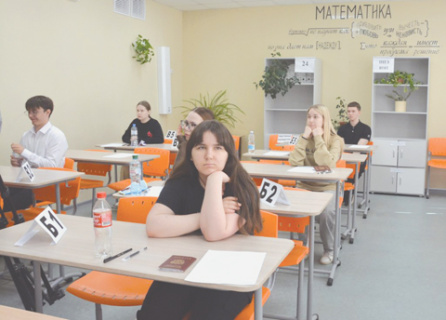
Rosobrnadzor summed up the first results of the Unified State Exam-2025 in specialized mathematics. The main wave took this exam on May 27. At the same time, the number of students amounted to 306 thousand, which is significantly more than in 2024. Apparently, it has reached the consciousness of some of our youth that blogging and pizza delivery are not eternal professions. And this is an undoubted plus.
Now about the points. We should immediately note that there was no breakthrough in terms of the average score. According to preliminary estimates, he scored 62 test points out of a possible 100. It’s the same three if you convert it to a five-point system. But there is a caveat.
Last year, the importance of primary test scores increased dramatically from 64 to 70. This relatively artificial measure gave a good increase in the average score. Nothing has changed this year, and the average score itself has hardly changed. And that’s not bad either. Or, as it is fashionable to say now, not negatively.
Ivan Yashchenko, head of the commission for the development of control and measuring materials for the Unified State Exam in mathematics, traditionally noted that all assignments fully comply with the school curriculum. Students and parents are also traditionally expected to be indignant about the inconsistency of assignments with the school curriculum.
This happens every year. Every year there is a wave of protests demanding the abolition of the Unified State Exam. At the same time, none of the protesters has offered anything really worthy yet.
What do I personally think about statistics? Statistics are a good and correct thing. However, it has practically nothing to do with competition between applicants. Let’s think about it.
If the average score is 62 (as it is now), then the scores of the majority of those who take specialized mathematics range from 60-70. Scores of 80+ are already rarer, and scores of 90+ are quite rare. Under such conditions, students who have passed 70 points may well expect to be placed at the university, as their result is better than most.
If the average score increases to 72 due to the simplification of tasks or the relaxation of requirements, then we will get a picture of score fluctuations in the range of 70-80 for the majority of applicants. At the same time, the chances of admission for the same student who received 70 points today, and would have received 80 points under a different scoring system, will practically not change.
Moreover, to receive the so–called medals for special achievements in learning (they give additional points to the results of the Unified State Exam when applying to some universities), it is enough to get 70 points for a gold medal and 60 points for a silver medal in specialized mathematics. The interests of the “lyricists”, among whom there are many excellent students, have been respected.
Thus, the assignment options prepared by the Federal Institute of Pedagogical Measurements (FIPI) are quite well thought out, and the scores are generally fair. A large number of average students are able to pass the test by 60-70 points. This is enough for admission to a regular university.
Students with advanced training can easily complete the so-called gentleman’s set: tasks 1-12 of the test part plus equation (task 13), inequality (task 15), economics (task 16) and the first two points of task 19 on numbers. This will give a score of 80+ points, which is really important for mathematics and IT departments.
But there is one more nuance. Mathematics is not the only exam in the Unified State Exam system. And if physics and computer science are close to mathematics, then the Russian language is not at all close. In the meantime, it is taken into account everywhere and everywhere.
Let’s say that a student has written 80 points in mathematics, and only 50 points in Russian. The average score in two subjects will be only 65 points. And this is a real chance to fly past the university.
To summarize. If you think about it, the basic level of the Unified State Exam in mathematics was invented for “lyricists” whose future profession is far from exact sciences. Why not introduce a basic level of the Unified State Exam in Russian for “physicists”? Then the examination of knowledge on the Unified State Exam will probably be more specialized.
